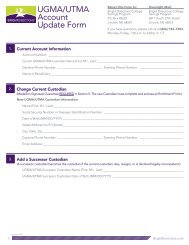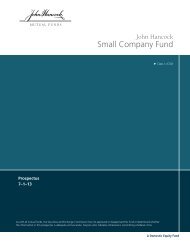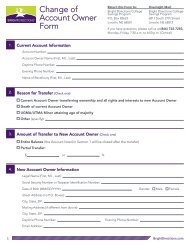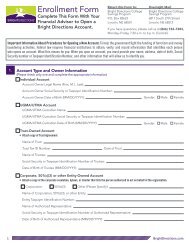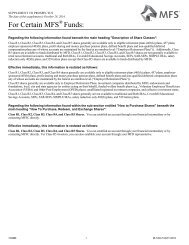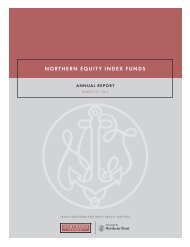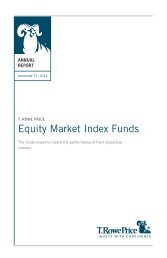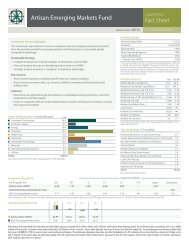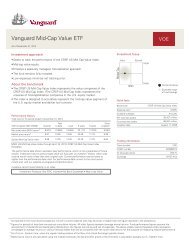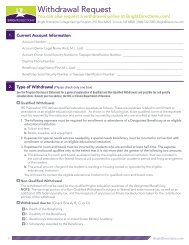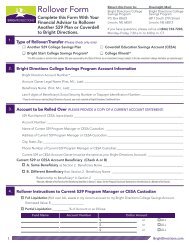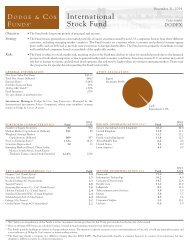Dodge & Cox Funds Statutoary Prospectus dated May 1, 2013
Dodge & Cox Funds Statutoary Prospectus dated May 1, 2013
Dodge & Cox Funds Statutoary Prospectus dated May 1, 2013
You also want an ePaper? Increase the reach of your titles
YUMPU automatically turns print PDFs into web optimized ePapers that Google loves.
eligible defined contribution employee benefit plansholding the <strong>Funds</strong>. The level of payments made to aqualifying Financial Intermediary in any given year willequal approximately 0.10% of the market value of theStock, Global Stock, International Stock, and BalancedFund accounts serviced by the Financial Intermediary(0.08% of the market value of Income Fund accounts). Anumber of factors will be considered in determiningwhether compensation should be paid to a FinancialIntermediary, including the qualifying FinancialIntermediary’s willingness to enter into an AdministrativeService Agreement (or equivalent), the recordkeeping,reporting, or other services to be provided, and the qualityof the relationship with such <strong>Funds</strong>. <strong>Dodge</strong> & <strong>Cox</strong> makesthese payments to help defray the costs incurred byqualifying Financial Intermediaries in connection withefforts to maintain employee benefit plan accounts forparticipants in a cost efficient manner; however,<strong>Dodge</strong> & <strong>Cox</strong> does not audit the Financial Intermediaries toverify the extent or nature of services provided.<strong>Dodge</strong> & <strong>Cox</strong> will, on a periodic basis, determine theadvisability of continuing these payments. These paymentsmay be more or less than the payments received byFinancial Intermediaries with respect to other mutual fundsand may influence your Financial Intermediary to makeavailable a Fund over other mutual funds. You should askyour Financial Intermediary about these differing anddivergent interests and how it is compensated foradministering your Fund investment.EXCESSIVE TRADING LIMITATIONSThe <strong>Funds</strong> are intended for long-term investmentpurposes and not for market timing or excessive shorttermtrading (excessive trading). The <strong>Funds</strong>’ Board ofTrustees has approved policies and procedures designed todetect and deter excessive trading in the <strong>Funds</strong>.Although there is no generally applied standard inthe marketplace as to what level of trading activity isexcessive, a Fund may consider that you have violated theexcessive trading policy if it determines:▪ You sell or exchange shares within a short period oftime after the shares were purchased;▪ You enter into a series of transactions that is indicativeof an excessive trading pattern or strategy; or▪ The Fund reasonably believes that you have engaged insuch practices in connection with other mutual funds.Certain transactions are exempt from the excessivetrading policy:▪ Shares purchased through reinvested distributions(dividends and capital gains);▪ Shares purchased through an automatic investment plan;▪ Shares sold through a systematic withdrawal plan;▪ Scheduled retirement plan contributions;▪ Required distributions from individual retirementaccounts (IRA), pension or other retirement plans, andcharitable organizations or endowments;▪ IRA transfers of assets, Roth IRA conversions, orIRA recharacterizations; and▪ Shares purchased through certain “fund of funds” andasset allocation programs.Excessive trading may present risks to you or to aFund in which you are a shareholder, including:▪ Negative impact on a Fund’s performance;▪ Dilution in the value of a Fund’s shares;▪ Interference with the efficient management of a Fund’sportfolio, such as the need to maintain undesirablylarge cash positions or to buy or sell securities itotherwise would not have bought or sold;▪ Losses on the sale of investments resulting from theneed to sell securities at less favorable prices;▪ Increased taxable gains to a Fund’s remainingshareholders resulting from the need to sell securities tomeet redemption requests; and▪ Increased brokerage and administrative costs.These risks may be greater to the extent a Fundinvests in non-U.S. securities, which are believed to bemore susceptible to pricing inefficiencies and time zonearbitrage. Time zone arbitrage may occur because of timezone differences between the foreign markets on whichthe <strong>Funds</strong>’ non-U.S. portfolio securities trade and the timeas of which the <strong>Funds</strong>’ NAV is calculated. For example,traders engaging in time zone arbitrage may seek to exploitchanges in value of the <strong>Funds</strong>’ portfolio securities thatresult from events occurring after foreign market prices areestablished, but before calculation of the <strong>Funds</strong>’ NAV.Arbitrageurs who are successful may dilute the interests ofother shareholders by trading shares at prices that do notPAGE 48 ▪ D ODGE & C OX F UNDS



